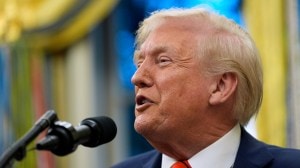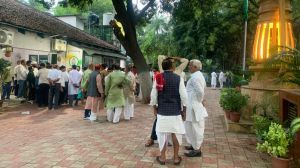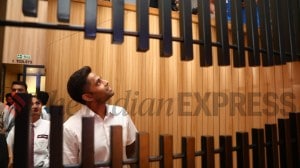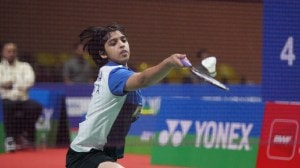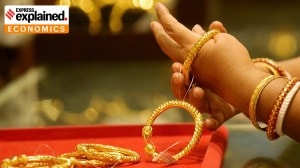Article 370 verdict: For INDIA bloc, the twofold political challenge that awaits it
Several Opposition leaders are cognizant of the political minefield that they now have to navigate. "It took the BJP decades to reach here. We are also prepared for the long haul,” says Omar Abdullah.
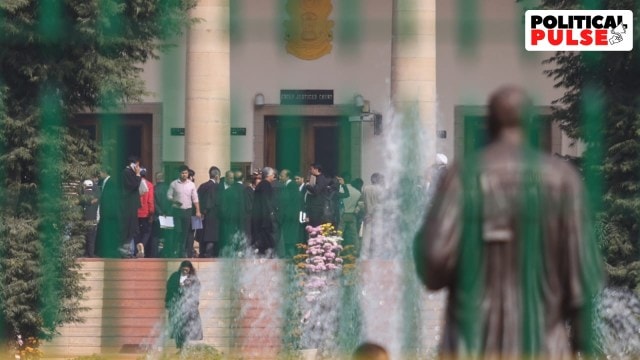 Lawyers outside the court room during the judgment on Article 370, at Supreme Court in New Delhi on Monday. (Express Photo by Praveen Khanna)
Lawyers outside the court room during the judgment on Article 370, at Supreme Court in New Delhi on Monday. (Express Photo by Praveen Khanna)With the Supreme Court upholding the constitutional validity of the abrogation of Article 370 on Monday, the INDIA bloc’s primary challenge now will be framing a response to the verdict as the BJP is expected to project it as a ringing endorsement of its actions in Jammu and Kashmir in August 2019.
Most of the parties in the Opposition alliance believed there was little chance of the top court reversing the revocation of the special status enjoyed by the erstwhile state under the now-scrapped law. Most of them were already of the view that it was a “done deal” but hoped the court would restore statehood to Jammu and Kashmir and direct holding of elections. The court in its ruling told the Election Commission (EC) to conduct Assembly elections in Jammu and Kashmir by September 30, 2024, and directed the Centre to restore J&K’s statehood at the earliest.
For the INDIA bloc, the political challenges are two-fold. First, it has to reconcile differences within. The AAP supported the Centre’s decision in 2019, the Congress initially opposed the scrapping of Article 370 but later nuanced its position, while the Left and the socialist bloc continued to strongly believe that Article 370 should be reinstated as it was the only link between Jammu and Kashmir and the rest of India.
Second, and most importantly, the alliance has to formulate its response, and a united one at that, as many leaders believe popular sentiment has always been in favour of the abrogation of Article 370. The parties are mindful of the fact that Lok Sabha elections are just around the corner. From demonetisation and Pegasus row to the controversy surrounding the purchase of Rafale fighter jets, the Opposition’s criticism of the BJP government in the past lost steam after the top court ruled in the government’s favour. The parties also had to nuance their positions after the Ayodhya verdict.
Sources in several Opposition parties said they were reconciled to the fact that reinstating Article 370 was impossible. The Congress was a divided house in 2019 and remains a divided house now. Minutes after the verdict, Congress leader and former Union Minister Milind Deora posted on X, “I welcome the Supreme Court’s verdict on Article 370 & believe that the judgement transcends politics. Furthermore, my stance on the issue is shaped by personal experiences in Kashmir.”
The Congress strongly opposed the abrogation of Article 370 in the Rajya Sabha on August 5, 2019, but several leaders, mostly the younger lot, backed the move outside.
The Congress Working Committee (CWC), which met on August 6, discussed the issue threadbare and slammed the government but was silent on the question of restoring special status. Several young leaders at the time argued that the public sentiment was in favour of abrogation and the party would have to factor in the nation’s mood.
Taking a cautious stand, the CWC said Article 370 was the “Constitutional recognition of the terms of the Instrument of Accession between the State of Jammu & Kashmir and India” and that it “deserved to be honoured until it was amended, after consultation with all sections of the people, and strictly in accordance with the Constitution of India.” It deplored the “unilateral, brazen and totally undemocratic manner” in which it was abrogated and the “State of Jammu and Kashmir was dismembered by misinterpreting the provisions of the Constitution”.
But the Congress did not demand the reinstatement of Article 370. Since then, it has time and again pointed to the CWC resolution as the party’s stand. “I do believe that the statehood issue about J&K is far more important in comparison to Article 370 issue which now, irrespective of legalities and nuances, is a done deal. As a practitioner, I didn’t expect the apex court to reverse the latter. However, statehood is a vital issue of deprivation of democratic aspirations and impulses which must be rectified by the central government without dilatory excuses,” CWC member Abhishek Singhvi told The Indian Express in his personal capacity.
The Peoples Democratic Party (PDP) and the National Conference (NC), which are part of the INDIA bloc, strongly opposed the abrogation. Given that the AAP had backed the government, NC leader Omar Abdullah took a swipe at the Arvind Kejriwal-led party when it asked Opposition parties to come together earlier this year to oppose the Centre’s ordinance for control of services in the national capital.
On Monday, Omar posted on X, “Disappointed but not disheartened. The struggle will continue. It took the BJP decades to reach here. We are also prepared for the long haul.”
“People of J&K not going to give up, our fight for honour and dignity will continue. Not end of road: Mehbooba Mufti on SC verdict,” PDP leader Mehbooba Mufti said on X.
Navigating a minefield
Asked how the INDIA alliance would reconcile the divergent views, senior Janata Dal (United) leader K C Tyagi said, “AAP ko chhodiye (Forget about AAP). All the Communist parties, the entire socialist movement led by Akhilesh Yadav, Lalu Yadav and Nitish Kumar, the NCP, the DMK, the Lok Dal factions, and the Congress were in favour of restoration of status quo ante.”
He added, “JD(U) and the Socialist movement led by JP and Ram Manohar Lohia before that agreed with the inclusion of Article 370 in the Constitution. Lohia and JP even visited Sheikh Abdullah in jail many times. In the manifesto of the Janata Party in 1977 — the Jana Sangh was also a part — said Article 370 would not be touched and it would remain a part of the Constitution. When we joined the NDA (during Vajpayee’s time when George Fernandes was the convenor), our first condition was that Article 370 should not be disturbed. When the Narendra Modi government brought the Bill in the Rajya Sabha, we were in the NDA but we walked out.”
Tyagi, like many Opposition leaders, is cognizant of the political minefield that the Opposition now has to navigate. “We respect the honour and majesty of the Constitution. The BJP has criticised the Supreme Court on many issues, even the ministers. We were of a different opinion on the Ram Janmabhoomi-Babri Masjid issue but we said we respect the court verdict. The BJP, on the other hand, went jubilant. The issue went in favour of the politics of polarisation of the Sangh. They celebrated it so that we oppose it and they can further the politics of polarisation. So, it is difficult for the Opposition when one stands firm with one’s political views,” he said.






- 01
- 02
- 03
- 04
- 05








